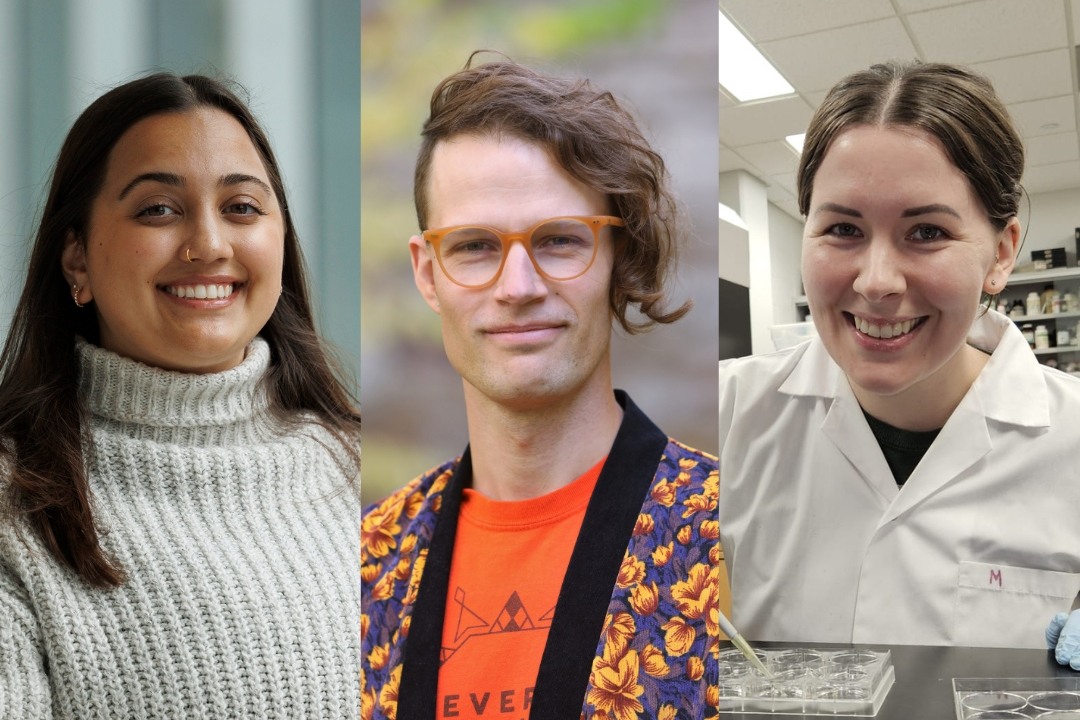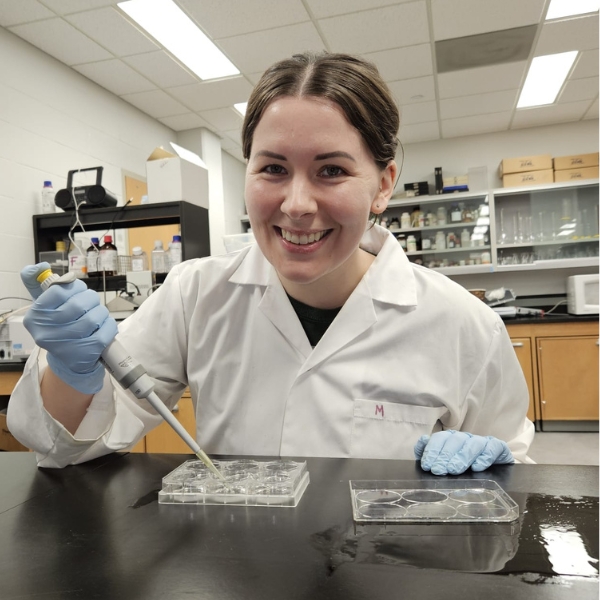
Trio of USask graduate students receive prestigious Vanier Scholarships
Three students in USask’s College of Graduate and Postdoctoral Studies (CGPS) have received funding to support innovation in diverse fields of English literature, community air quality, and plant and nutrition genetics.
By Matt Olson, Research Profile and ImpactThe prestigious and competitive Vanier Canada Graduate Scholarships are designed to help universities recruit and support the best and brightest graduate students – and this year, three University of Saskatchewan (USask) students have received the esteemed honour.
The Vanier program is jointly administered by the Canadian Institutes of Health Research (CIHR), the Natural Sciences and Engineering Research Council of Canada (NSERC) and the Social Sciences and Humanities Research Council (SSHRC). Each of the three USask-based Vanier Scholars are respectively located in a different area of supported research.
Vanier Scholarships are valued at $50,000 per year for three years of doctoral-level study, and consider three criteria for selection: academic excellence, research potential and a potential and demonstrated leadership ability.
“The Vanier Scholarships are extremely special in their equally weighting past academic excellence with research potential and leadership,” said Dr. Debby Burshtyn (PhD), dean of USask’s CGPS. “The three 2024 recipients are already making their mark in our university; it’s wonderful to see that we are attracting and retaining such talent across the areas of humanities, health and STEM research.”
The Vanier Scholarship is considered one of the most competitive competitions for aspiring scholars in Canada, and USask’s three recipients are already hard at work in their areas of research.
Identifying trans representation in early 20th century literature

Delving into literature from the 20s, 30s and 40s, Gwen Rose is investigating trans representation in historic literature.
A PhD student in the College of Arts and Science under the supervision of Dr. Ella Ophir (PhD), Rose is examining works from late modernist literature to identify trans representation through characters in early 20th-century novels.
Rose said earning the Vanier scholarship provided an “unfathomable” level of financial security to pursue this line of research. She noted that one of the criteria for earning a Vanier scholarship was demonstrated leadership and hoped to continue pursuing acts of community and volunteer service while pursuing her PhD with the support of the scholarship.
Impacts of drought-induced poor air quality heart of PhD research

Working in the Department of Geography and Planning in the College of Arts and Science and with the Global Institute for Water Security (GIWS), Krishna Kolen’s work explores the impact of air quality issues in Saskatchewan communities.
Under the joint supervision of Dr. Corrine Schuster-Wallace (PhD) and Dr. Krystopher Chutko (PhD), Kolen is working with Indigenous communities to examine and document health impacts caused by poor air quality from dust storms and wildfires.
Through this work, Kolen hopes to establish “early warning tools” for use in communities so they can identify signs of imminent-reduced air quality conditions and adjust accordingly.
“Air quality is not just a Saskatchewan problem, it’s not just a Canadian problem, but air quality events are a global problem,” she said. “As droughts increase under a changing climate, so will these poor air quality events.
“We’ll create early warning tools with our partnering communities here in Saskatchewan and we’ll assess if they are transferable to other drought-prone communities.”
It’s well-known that poor air quality has an impact on human health. Kolen’s research will explore where the most vulnerable populations and activities are located and how communities can mitigate those health impacts.
“By understanding health impacts, changes to day-to-day activities and different levels of exposure within groups in communities, the tool could help identify and respond to different levels of exposure,” she said. “Examples would be, ‘Where can I go for help? What resources do I need? What should I do if I have these health impacts?’”
Kolen hasn’t started her PhD yet – she’s slated to begin in the fall – but the Vanier scholarship means her air quality research can have further-reaching impacts than Saskatchewan.
The ultimate goal is to see if the tools they develop will be transferable to other communities threatened by air quality issues across Canada and around the world, and the support of the Vanier scholarship has the potential to make that goal a reality.
“It's huge, the fact we can do all these things without worrying about the finances,” she said. “I can focus on the important parts, engagement and connecting with community members and making those relationships ... being a Vanier Scholar gives me the flexibility to focus on the research that is important to me and the communities.”
Plants, food and the secret to living longer and healthier lives

USask researcher Morgan Fleming is examining how a component of plant-based foods might help you live a longer life.
Fleming, a PhD student in the College of Agriculture and Bioresources, is exploring how phenolic compounds – present in all plant-based foods – have impacts on the health of human cells.
“My research is contributing to promoting the human health span,” she said. “It’s going to be helping us all live healthier for longer through delaying the onset of age-related disease.”
It’s known that phenolic compounds are good for humans due to their antioxidant properties, but Fleming said recent research suggests they could do more for humans with regard to cellular processes and regulating health and disease. Her research will investigate how they mechanistically achieve those benefits in human cells.
Fleming said she was excited to delve into an area of science that can help humans at large live healthier and longer and noted this research could expand into animals too.
“I am excited to help people not be burdened by the physical deterioration that comes with aging, to delay age-related disease and help us all live healthier,” she said. “Helping us, helping our pets, and improving quality of life for people.”
Working under the supervision of Dr. Christopher Eskiw (PhD) and professor emeritus Dr. Nicholas Low (PhD), Fleming is cultivating human cell samples and treating them with various phenolic compounds to analyze how they directly affect cells.
Fleming said becoming a Vanier Scholar was “very motivating” for her, because it showed that the federal program believes in her, her research and her community outreach-oriented goals for this work.
It’s an exciting prospect to continue this field of research, and Fleming said the Vanier Scholarship opens new possibilities for her studies.
“(Being a Vanier Scholar) means we’re going to be able to perform more high-quality research, not nearly as limited by funding, and have more opportunities to share my research at conferences,” she said.
Together we will support and inspire students to succeed. We invite you to join by supporting current and future students' needs at USask.

